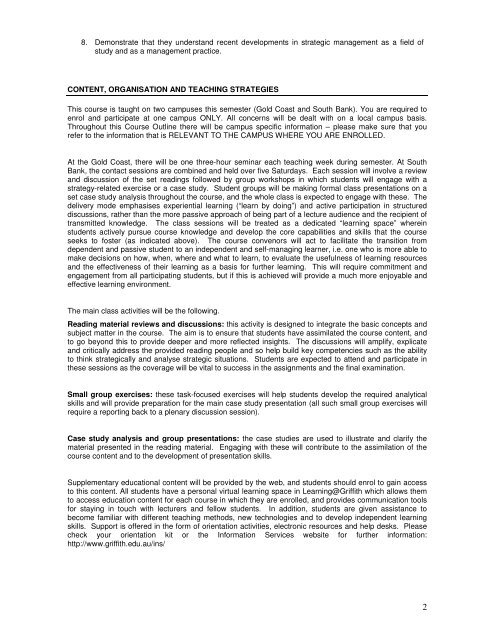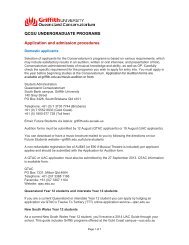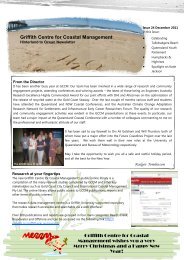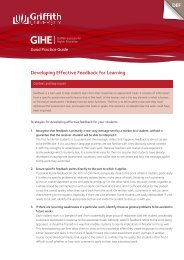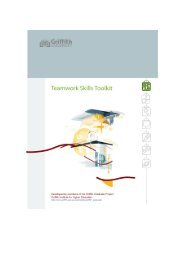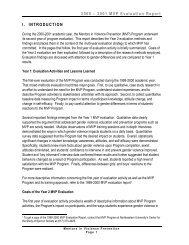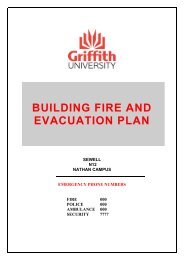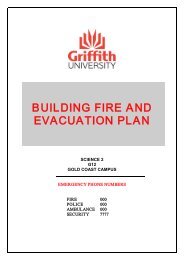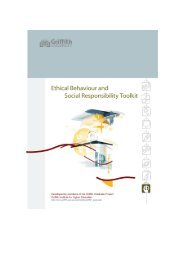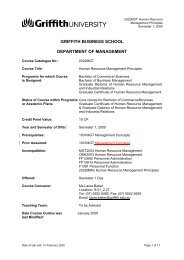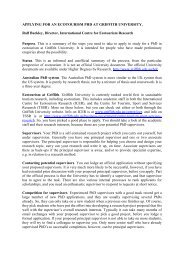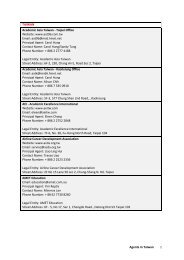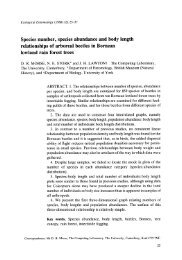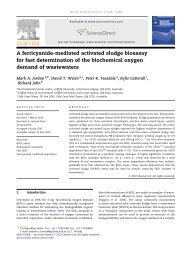7907MGT Managing Strategically Semester 2 ... - Griffith University
7907MGT Managing Strategically Semester 2 ... - Griffith University
7907MGT Managing Strategically Semester 2 ... - Griffith University
Create successful ePaper yourself
Turn your PDF publications into a flip-book with our unique Google optimized e-Paper software.
8. Demonstrate that they understand recent developments in strategic management as a field of<br />
study and as a management practice.<br />
CONTENT, ORGANISATION AND TEACHING STRATEGIES<br />
This course is taught on two campuses this semester (Gold Coast and South Bank). You are required to<br />
enrol and participate at one campus ONLY. All concerns will be dealt with on a local campus basis.<br />
Throughout this Course Outline there will be campus specific information – please make sure that you<br />
refer to the information that is RELEVANT TO THE CAMPUS WHERE YOU ARE ENROLLED.<br />
At the Gold Coast, there will be one three-hour seminar each teaching week during semester. At South<br />
Bank, the contact sessions are combined and held over five Saturdays. Each session will involve a review<br />
and discussion of the set readings followed by group workshops in which students will engage with a<br />
strategy-related exercise or a case study. Student groups will be making formal class presentations on a<br />
set case study analysis throughout the course, and the whole class is expected to engage with these. The<br />
delivery mode emphasises experiential learning (“learn by doing”) and active participation in structured<br />
discussions, rather than the more passive approach of being part of a lecture audience and the recipient of<br />
transmitted knowledge. The class sessions will be treated as a dedicated “learning space” wherein<br />
students actively pursue course knowledge and develop the core capabilities and skills that the course<br />
seeks to foster (as indicated above). The course convenors will act to facilitate the transition from<br />
dependent and passive student to an independent and self-managing learner, i.e. one who is more able to<br />
make decisions on how, when, where and what to learn, to evaluate the usefulness of learning resources<br />
and the effectiveness of their learning as a basis for further learning. This will require commitment and<br />
engagement from all participating students, but if this is achieved will provide a much more enjoyable and<br />
effective learning environment.<br />
The main class activities will be the following.<br />
Reading material reviews and discussions: this activity is designed to integrate the basic concepts and<br />
subject matter in the course. The aim is to ensure that students have assimilated the course content, and<br />
to go beyond this to provide deeper and more reflected insights. The discussions will amplify, explicate<br />
and critically address the provided reading people and so help build key competencies such as the ability<br />
to think strategically and analyse strategic situations. Students are expected to attend and participate in<br />
these sessions as the coverage will be vital to success in the assignments and the final examination.<br />
Small group exercises: these task-focused exercises will help students develop the required analytical<br />
skills and will provide preparation for the main case study presentation (all such small group exercises will<br />
require a reporting back to a plenary discussion session).<br />
Case study analysis and group presentations: the case studies are used to illustrate and clarify the<br />
material presented in the reading material. Engaging with these will contribute to the assimilation of the<br />
course content and to the development of presentation skills.<br />
Supplementary educational content will be provided by the web, and students should enrol to gain access<br />
to this content. All students have a personal virtual learning space in Learning@<strong>Griffith</strong> which allows them<br />
to access education content for each course in which they are enrolled, and provides communication tools<br />
for staying in touch with lecturers and fellow students. In addition, students are given assistance to<br />
become familiar with different teaching methods, new technologies and to develop independent learning<br />
skills. Support is offered in the form of orientation activities, electronic resources and help desks. Please<br />
check your orientation kit or the Information Services website for further information:<br />
http://www.griffith.edu.au/ins/<br />
2


